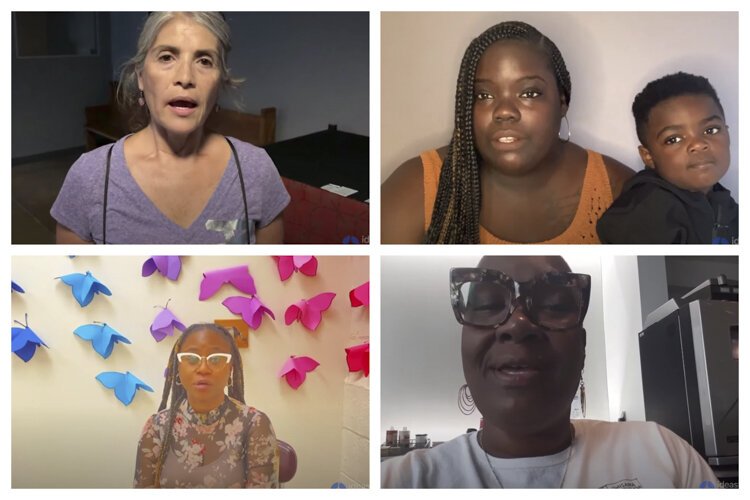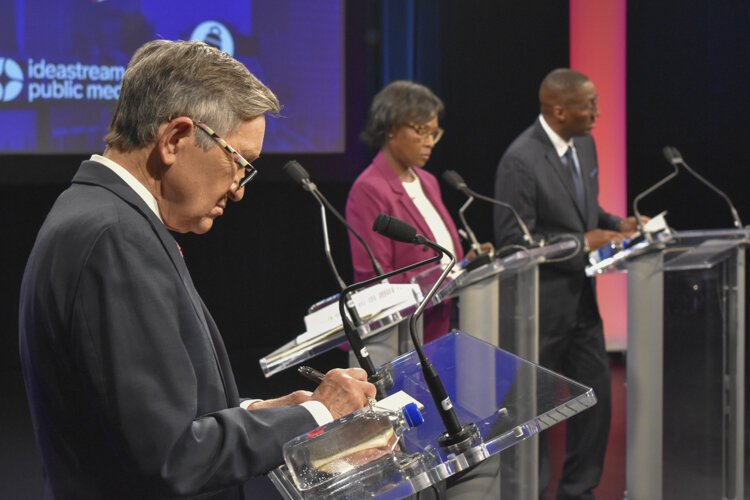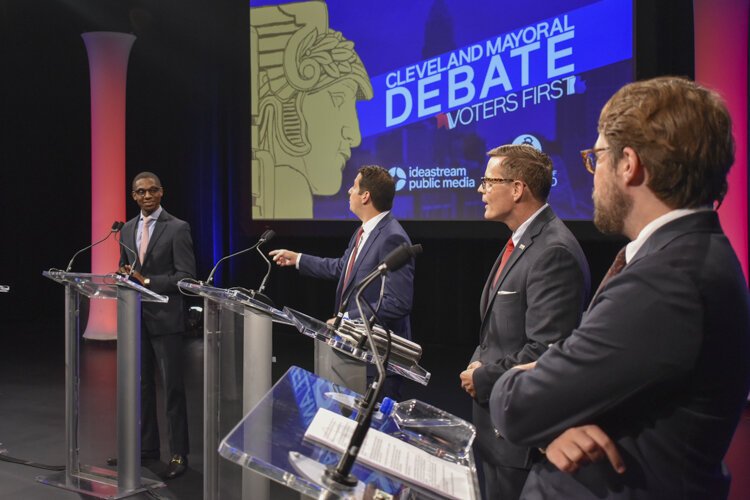Voters first: What residents thought of Cle mayoral candidates’ responses on economy and education
How can Cleveland create more jobs that pay a living wage? How can the city support Hispanic business owners? And how can the Cleveland Metropolitan School District attract new students?
These were all questions that came directly from city residents during the second Cleveland mayoral debate on Aug. 17, hosted by Ideastream Public Media and The City Club of Cleveland. The questions during this round challenged the mayoral candidates to envision a city with a strong economy, a clean and safe environment and a robust public education system. Just as we did after the first debate, the Northeast Ohio Solutions Journalism Collaborative (NEO SoJo) reached out to residents who asked questions to see what they thought of the candidates’ responses.
 Sonia Monroy, Leah Hudnall, Rhonda Jones and Courtney Green all asked a question during the second mayoral forum.Courtney Green, an educator at John Hay High School in Cleveland, asked: “How do you plan to cultivate a system of support to retain our cities’ young professionals, specifically those who have been born and raised in Cleveland, and/or come from historically marginalized communities?”
Sonia Monroy, Leah Hudnall, Rhonda Jones and Courtney Green all asked a question during the second mayoral forum.Courtney Green, an educator at John Hay High School in Cleveland, asked: “How do you plan to cultivate a system of support to retain our cities’ young professionals, specifically those who have been born and raised in Cleveland, and/or come from historically marginalized communities?”
Green’s question notably caused a tiff between former Councilman Zack Reed and current Councilman Basheer Jones, who said young people are not given opportunities to become involved in politics, a point Reed disputed.
Green said she wished all the candidates—not just Reed and Jones—had focused on the questions asked. Neither provided a clear answer to her question, she said.
“There’s a lot about what they did do and what the other person didn’t do or did do, there was a lot of that this weeknight, and I’m like, “Come on now!’” Green said
Former U.S. Congressman Dennis Kucinich, Cleveland Council President Kevin Kelley and Ohio Rep. Sandra Williams all said the city needs to do a better job of providing basic services and amenities to retain young professionals.
For Kelley, it was safe neighborhoods and good schools. Kucinich also mentioned public safety and said the city needs to be cleaned up and its entertainment districts should be bolstered. Williams said high-quality public education is needed.
Nonprofit executive Justin Bibb said Cleveland needs to invest in its cultural assets to better reflect its status as a majority-Black city, while opening up opportunities for people to work in city government. Attorney Ross DiBello noted investments in cutting child poverty and improving public transit have significant returns on investment, and suggested starting there.
Green said she appreciated the talk on improving the city’s basic services, especially well-maintained roads and safer pedestrian infrastructure. But she added that there’s not enough attention paid to connecting young people to job opportunities and resources that already exist.
“Have you really talked to the people that need those resources? Can they access it well? That’s the problem,” Green said.
 Cleveland mayoral candidates Dennis Kucinich, Sandra Williams and Zack Reed.A living wage?
Cleveland mayoral candidates Dennis Kucinich, Sandra Williams and Zack Reed.A living wage?
Rhonda Jones, a Stockyards resident who works at Case Western Reserve University in the finance and administration department, said she similarly was concerned about access to job opportunities, asking candidates what they saw as the biggest challenges facing residents “in terms of getting jobs that pay a living wage.”
Reed and Kelley quarreled over the question without answering it directly, with Reed (and Kucinich) blasting Kelley for advocating that state government prevent the city of Cleveland from implementing a $15-an-hour minimum wage in 2016. Kelley shot back that he and Reed both voted down a city-wide measure that would have done the same in 2016 and said he was opposed because if Cleveland alone did it, it would hurt businesses here. Both candidates now say they support such an effort. Williams said a measure like this “should have its day at the polls.”
Meanwhile, Jones touted his record on working with others to bring new jobs to Ward 7, arguing the city needs to take an active role in encouraging development. Bibb said investment in job-training programs that target both youth and adults would be key. And Kucinich said he would leverage his connections with the federal government to bring additional funding to encourage economic development.
Rhonda Jones said she wasn’t impressed by the “old guard” of candidates, and was excited by Bibb’s embrace of the power of entrepreneurship.
“We need young thoughts that can move past the Kuciniches and the Zack Reeds,” she said. “Don’t get me wrong, Basheer Jones, he’s good, but we need leadership that is going to take this city into a totally different direction.”
Supporting Hispanic businesses
Sonia Monroy, an activist who lives in Cleveland’s Old Brooklyn neighborhood, asked the candidates if they have visited Hispanic businesses in Cleveland to learn about their needs, as well as what they will do to ensure those businesses’ success.
All of the candidates responded with varying examples of outreach or interactions they’ve had with the Hispanic community in Cleveland, but Kelley was the only one to mention a specific business—the 787 Market on Memphis Avenue in Old Brooklyn.
DiBello mentioned the candidates’ first debate hosted by the Hispanic Roundtable, and said that organization, along with others in the city, deserves transparency about how city funds are used to support businesses. Jones said he sat down with business owners at the West Side Market and lamented the city’s failures with that facility, while pledging the city would do more business with Hispanic and Black business owners under his leadership.
Kucinich said he had a liaison to the Hispanic community while he was a U.S. Congressman, and would replicate that in Cleveland. Reed and Williams both touted listening sessions they’ve had with Hispanic business owners regionally and across the state, Reed in his role as a minority business liaison with the Ohio Secretary of State. And Bibb said he talked with the executive director of Metro West Community Development Corporation about challenges business owners faced with receiving small business loans during the pandemic, and said Cleveland City Hall is “outdated” and not business-friendly.
Monroy said she wasn’t impressed with any of the candidates’ responses. She said she hasn’t heard of any of the candidates actually doing the kind of deep listening to Hispanic business owners that she’d hoped for. She said these business owners face unique challenges and have never been supported fully by city administration. She, in particular, took Bibb to task for mentioning his interactions with Metro West, which is not a business, adding that he and the other candidates need to actually sit down with the owners themselves.
What about education?
Debate around what the Cleveland Metropolitan School District needs to be more successful was another theme throughout the night. Mill Creek resident Leah Hudnall and her son, Dom, asked the candidates what they will do to attract new young families to enroll with CMSD, noting that many times, “perception outweighs reality in the quality we have in the public education system.”
Kelley said he agreed with Hudnall, noting he moved his daughter from a charter school to a public school after receiving a call from a CMSD outreach coordinator. He said more of those coordinators are needed to actively recruit students. Bibb said there needs to be more investment in teachers, as well as more investment in out-of-school support programs like the Boys and Girls Club. Kucinich advocated for bolstered pre-kindergarten programs, and called for more testing for lead poisoning of children.
Meanwhile, Jones said schools need more funding for wrap-around services and to promote the social-emotional wellbeing of children; Williams said Ohio’s grade card system needs to be reformed and that she would meet with parents personally; Reed advocated for job readiness programs for students, including turning Collinwood High School into a vocational school and DiBello said he would push for more extra-curricular opportunities for students, referencing music and arts programs, chess clubs and children reading to adoptable dogs.
Hudnall, who said she comes from a long line of CMSD graduates, said she was mostly pleased with the discussion.
“I would love to learn what an elected school board might look like, and if it’s a good route for us as a city,” she said. “I definitely couldn’t agree more that we need teachers who respect the neighborhoods in which they teach, and the children that come from them.”
But she said Kucinich’s response immediately presented a narrative that CMSD schools are “unsafe,” something she disagrees with. And she said he never acknowledged the good work of nonprofit Pre4Cle while advocating for a universal pre-K program, nor did he mention the efforts of CLASH or Lead Safe Cleveland when talking about the need to test children for lead poisoning.
“I don’t believe we have time for a leader who seeks to recreate or dismiss the momentum we have going in Cleveland,” Hudnall said.
The Cleveland mayoral primary election is Tuesday, Sept. 14, with early voting available now. The top two vote getters move on to the Nov. 2 general election.
Have your own thoughts on what’s needed to lift the economic profile of all Cleveland residents? Take our survey, or come to our listening session on Aug. 28 or our Zoom listening session for LGBTQ+ business owners on Aug. 30!
This story is sponsored by the Northeast Ohio Solutions Journalism Collaborative, which is composed of almost 20 Northeast Ohio news outlets including FreshWater Cleveland.


